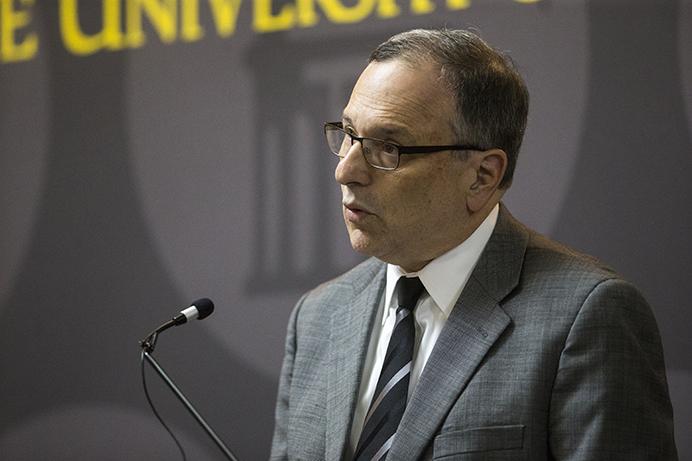High-risk drinking among University of Iowa students is at its lowest in 25 years, according to data from an annual survey, but students still experience more negative consequences from alcohol use compared to other campuses nationwide.
The 2017 National College Health Assessment’s anonymous survey of 622 UI students revealed that since 2012, high-risk drinking — which is defined as consuming five or more drinks on one occasion in the last two weeks — has fallen from 64.1 percent to 50.5 percent.
In 2009, the UI formed the Alcohol Harm Reduction Advisory Committee to address unsafe alcohol consumption on campus under the leadership of former Vice President for Student Life Tom Rocklin. The committee released its third Alcohol Harm Reduction Plan spanning from 2016-2019 last year.One metric of success highlighted in the plan’s current version is to reach a target of 20 percent of students drinking 10 or more days per month. The NCHA survey found the UI surpassed this target early, dropping to 19 percent.
“I’d like to thank the Alcohol Harm Reduction Advisory Committee for their steady and fruitful work at addressing this campus issue,” UI Vice President for Student Life Melissa Shivers said in a press release. “While this latest report shows our progress, it also shows us that there is work still to be done nurturing a healthier culture to maximize student success.”
Ongoing efforts to address high-risk drinking
The number of students experiencing negative consequences from drinking has not been significantly reduced — since 2012, it has dropped from 58.3 percent to 56.6 percent, according to NCHA survey data.
UI Student Government passed a resolution in November 2016 to encourage the state Legislature to adopt medical-amnesty policies to protect underage people from prosecution in the event of a medical emergency caused by the illegal possession or consumption of alcohol.
The Iowa Senate passed a medical-amnesty bill in March and the state House will vote on it in the next legislative session.
RELATED: UISG moves on medical amnesty
Although UISG led the initiative to ensure safety for those who do engage in high-risk drinking, the larger issue of changing the perception of drinking requires the participation of parents, students, and the community at large, Tanya Villhauer, UI associate director for harm reduction and strategic initiatives, said in the press release.
“High-risk drinking isn’t inherent to being a Hawkeye, and with everyone’s help, we can continue to make progress on improving the undergraduate experience and giving students the best chance for success,” she said.
UI President Bruce Harreld said in a May interview with The Daily Iowan that the UI would need to take a look at its Orientation program to reach people as they join the campus community but also not ignore other student populations.
“I think it also raised the question of what are we doing beyond orientation — because every year maybe we need to have some deeper conversations about this,” he said. “We also have transfer students, as well as graduate students, and it’s raising the question of how we can help them. If they aren’t a first-year incoming student, they don’t get into our Orientations, so we’re missing a large portion of our community.”
Campus tragedies re-energize efforts to reduce high-risk drinking
After the deaths of UI students Sean Wu and Kamil Jackowski in April, UI greek life leaders announced in a statement an immediate and permanent ban on out-of-state formals. They also temporarily banned alcohol at all Panhellenic and Interfraternity Council events.
The bans were an acknowledgment of a “pervasive and dangerous alcohol culture that exists within” the greek community, the statement said.
RELATED: Iowa greek leaders announce alcohol ban
Greek community leaders did not respond to requests for comment at the time of publication.
In his May interview, Harreld said efforts to address high-risk alcohol consumption would be most effective if they were student-led rather than initiated by the administration. Conversations would take place with student leaders regarding the issue this summer, he said.
“We shouldn’t be bearing it, we need to be talking about it, addressing it, confronting it,” he said. “And the more we do that, hopefully, the more awareness, and the safer the campus will be … It’s not just campus, this is maybe a societal issue. I don’t believe drinking is just a greek issue. I don’t think it’s just a university issue.”
Rocklin told the DI in June he thinks incidents such as the deaths of Wu and Jackowski energize the community around combatting these issues, but he thinks efforts to address them in the long run need to be guided by broader examinations of what is going on.
“When we have a student die, whether it’s a high-profile death or not … that just breaks my heart,” he said. “… The fact that we have a high-profile death and we think that something about the culture in which that person lived contributed it, that can energize us, and I think it has, as far as the greek community goes. I think the students stepped up themselves and said, ‘We want to change some things about the culture, reduce the risk associated with the activities that we engage in.’ ”



